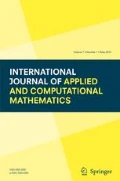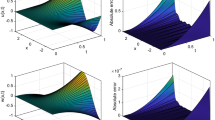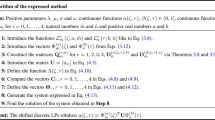Abstract
In the current study, we present the fractional-order Genocchi–Petrov–Galerkin method to investigate the approximate solution of time–space fractional Fokker–Planck equations (FFPEs). In the proposed approach, due to fractional Genocchi functions (FGFs) and their operational matrices transform these equations into a system of algebraic equations. The operational matrices of fractional-order integration and derivative are obtained by utilizing Riemann–Liouville fractional integral operator and Caputo fractional derivative, respectively. The convergence analysis of the proposed technique is rigorously discussed. To illustrate the applicability of the error formulas, we present the process of obtaining results for some examples. These examples are carried out to confirm the effectiveness of the proposed method.











Similar content being viewed by others
References
Aminataei, A., Vanani, S.K.: Numerical solution of fractional Fokker–Planck equation using the operational collocation method. Appl. Comput. Math. 12(1), 33–43 (2013)
Araci, S., Acikgoz, M., Bagdasaryan, A., Sen, E.: The Legendre polynomials associated with Bernoulli, Euler, Hermite and Bernstein polynomials (2013). ArXiv preprint arXiv:1312.7838
Bayad, A., Kim, T.: Identities for the Bernoulli, the Euler and the Genocchi numbers and polynomials. Adv. Stud. Contemp. Math. 20(2), 247–53 (2010)
Chen, S., Liu, F., Zhuang, P., Anh, V.: Finite difference approximations for the fractional Fokker–Planck equation. Appl. Math. Model. 33, 256–273 (2009)
Dehghan, M.: A computational study of the one-dimensional parabolic equation subject to nonclassical boundary specifications. Numer. Methods Partial Differ. Equ. 22(1), 220–257 (2006)
Dehghan, M., Tatari, M.: The use of He’s variational iteration method for solving a Fokker–Planck equation. Phys. Scr. 74, 310–316 (2006)
Dehestani, H., Ordokhani, Y., Razzaghi, M.: Fractional-order Legendre–Laguerre functions and their applications in fractional partial differential equations. Appl. Math. Comput. 336, 433–453 (2018)
Dehestani, H., Ordokhani, Y., Razzaghi, M.: Application of the modified operational matrices in multiterm variable-order time-fractional partial differential equations. Math. Methods Appl. Sci. 42, 7296–7313 (2019)
Dehestani, H., Ordokhani, Y., Razzaghi, M.: Hybrid functions for numerical solution of fractional Fredholm–Volterra functional integro-differential equations with proportional delays. Int. J. Numer. Model. 32, e2606 (2019)
Dehestani, H., Ordokhani, Y., Razzaghi, M.: Fractional-order Bessel functions with various applications. Appl. Math. 64(6), 637–662 (2019)
Dehestani, H., Ordokhani, Y., Razzaghi, M.: Numerical technique for solving fractional generalized pantograph-delay differential equations by using fractional-order hybrid bessel functions. Int. J. Appl. Comput. Math. 69, 1–27 (2020)
Dehestani, H., Ordokhani, Y., Razzaghi, M.: Pseudo-operational matrix method for the solution of variable-order fractional partial integro-differential equations. Eng. Comput. (2020). https://doi.org/10.1007/s00366-019-00912-z
Deng, W.: Finite element method for the space and time fractional Fokker–Planck equation. SIAM J. Numer. Anal. 47, 204–226 (2008)
Firoozjaee, M.A., Jafari, H., Lia, A., Baleanu, D.: Numerical approach of Fokker–Planck equation with Caputo–Fabrizio fractional derivative using Ritz approximation. J. Comput. Appl. Math. 339, 367–373 (2018)
Hashemi, M.S.: Group analysis and exact solutions of the time fractional Fokker–Planck equation. Phys. A 417, 141–149 (2015)
Heinsalu, E., Patriarca, M., Goychuk, I., Schmid, G., Hanggi, P.: Fractional Fokker–Planck dynamics: numerical algorithm and simulations. Phys. Rev. E 73, 1–9 (2006)
Heinsalu, E., Patriarca, M., Goychuk, I., Hanggi, P.: Fractional Fokker–Planck subdiffusion in alternating force fields. Phys. Rev. E 79(4), 041137 (2009)
Isah, A., Phang, C.: New operational matrix of derivative for solving non-linear fractional differential equations via Genocchi polynomials. J. King. Saud Univ. Sci. 31(1), 1–7 (2019)
Jumarie, G.: A Fokker–Planck equation of fractional order with respect to time. J. Math. Phys. 33, 3536–3542 (1992)
Khan, A., Abdeljawad, T., Gomez-Aguilar, J.F., Khan, H.: Dynamical study of fractional order mutualism parasitism food web module. Chaos Solitons Fractals 134, 109685 (2020)
Khan, H., Gomez-Aguilar, J.F., Alkhazzan, A., Khan, A.: A fractional order HIV-TB coinfection model with nonsingular Mittag-Leffler Law. Math. Method Appl. Sci. 43(6), 3786–3806 (2020)
Khan, A., Gomez-Aguilar, J.F., Khan, T.S., Khan, H.: Stability analysis and numerical solutions of fractional order HIV/AIDS model. Chaos Solitons Fractals 122, 119–128 (2019)
Kreyszig, E.: Introductory Functional Analysis with Applications. Wiley, New York (1978)
Lakestani, M., Dehghan, M.: Numerical solution of Fokker–Planck equation using the cubic B-spline scaling functions. Numer. Methods Partial Differ. Equ. 25(2), 418–429 (2009)
Liang, J., Ren, F., Qiu, W., Xiao, J.: Exact solutions for nonlinear fractional anomalous diffusion equations. Phys. A 385, 80–94 (2007)
Loh, J.R., Phang, C., Isah, A.: New operational matrix via genocchi polynomials for solving Fredholm-Volterra fractional integro-differential equations. Adv. in Math. Phy. 2017, 12 (2017)
Metzler, R., Jeon, J.H., Cherstvy, A.G., Barkai, E.: Anomalous diffusion models and their properties: non-stationarity, non-ergodicity, and ageing at the centenary of single particle tracking. Phys. Chem. Chem. Phys. 16(44), 24128–24164 (2014)
Odibat, Z., Momani, S.: Numerical solution of Fokker–Planck equation with space- and time-fractional derivatives. Phys. Lett. A 369(5), 349–358 (2007)
Pinto, L., Sousa, E.: Numerical solution of a time–space fractional Fokker Planck equation with variable force field and diffusion. Commun. Nonlinear Sci. Numer. Simulat. 50, 211–228 (2017)
Prakash, A., Kaur, H.: Numerical solution for fractional model of Fokker–Planck equation by using q-HATM. Chaos Solitons Fractals 105, 99–110 (2017)
Ray, S.S., Gupta, A.K.: A two-dimensional Haar wavelet approach for the numerical simulations of time and space fractional Fokker–Planck equations in modelling of anomalous diffusion systems. J. Math. Chem. 52(8), 2277–2293 (2014)
Risken, H.: The Fokker–Planck Equation. Springer, Berlin (1989)
Rivlin, T.J.: An Introduction to the Approximation of Functions. Dover Publications, New York (1981)
Shkilev, V.P.: Subdiffusion in a time-dependent force field. J. Exp. Theor. Phys. 114(5), 830–835 (2012)
Saravanan, A., Magesh, N.: An efficient computational technique for solving the Fokker–Planck equation with space and time fractional derivatives. J. King. Saud Univ. Sci. 28, 160–166 (2016)
Sepehrian, B., Radpoor, M.K.: Numerical solution of non-linear Fokker–Planck equation using finite differences method and the cubic spline functions. Appl. Math. Comput. 262, 187–190 (2015)
Sokolov, I.M., Klafter, J.: Field-induced dispersion in subdiffusion. Phys. Rev. Lett. 97(14), 140602 (2006)
Tatari, M., Dehghan, M., Razzaghi, M.: Application of the Adomian decomposition method for the Fokker–Planck equation. Math. Comput. Model. 45, 639–650 (2007)
Xie, J., Yao, Z., Gui, H., Zhao, F., Li, D.: A two-dimensional Chebyshev wavelets approach for solving the Fokker–Planck equations of time and space fractional derivatives type with variable coefficients. Appl. Math. Comput. 332, 197–208 (2018)
Yang, Y., Huang, Y., Zhou, Y.: Numerical solutions for solving time fractional Fokker–Planck equations based on spectral collocation methods. J. Comput. Appl. Math. 339, 389–404 (2018)
Yang, Q., Liu, F., Turner, I.: Computationally efficient numerical methods for time and space fractional Fokker–Planck equations. Phys. Scr. T136, 014026 (2009)
Yildirim, A.: Analytical approach to Fokker–Planck equation with space- and time-fractional derivatives by means of the homotopy perturbation method. J. King. Saud Univ. 22(4), 257–264 (2010)
Zhuang, P., Liu, F., Anh, V., Turner, I.: Numerical treatment for the fractional Fokker–Planck equation. ANZIAM J. 48, 759–774 (2007)
Zhang, H., Jiang, X., Yang, X.: A time–space spectral method for the time–space fractional Fokker–Planck equation and its inverse problem. Appl. Math. Comput. 320, 302–318 (2018)
Acknowledgements
We express our sincere thanks to the anonymous referees for valuable suggestions that improved the final manuscript.
Author information
Authors and Affiliations
Corresponding author
Ethics declarations
Conflict of interest
The authors declare that they have no conflict of interest.
Additional information
Publisher's Note
Springer Nature remains neutral with regard to jurisdictional claims in published maps and institutional affiliations.
Rights and permissions
About this article
Cite this article
Dehestani, H., Ordokhani, Y. & Razzaghi, M. Fractional-Order Genocchi–Petrov–Galerkin Method for Solving Time–Space Fractional Fokker–Planck Equations Arising from the Physical Phenomenon. Int. J. Appl. Comput. Math 6, 100 (2020). https://doi.org/10.1007/s40819-020-00859-6
Published:
DOI: https://doi.org/10.1007/s40819-020-00859-6
Keywords
- Fractional-order Genocchi functions
- Fractional Fokker–Planck equations
- Petrov–Galerkin method
- Operational matrix
- Error analysis




